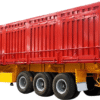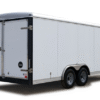When I first bought my dump trailer, one question kept nagging me—what’s the best hydraulic fluid to keep it running smoothly? After years of trial and error (and a few costly mistakes), I’ve learned that not all fluids are created equal. The right choice depends on your trailer’s system, operating conditions, and even the climate you work in.
I’ll admit, I used to think any generic hydraulic oil would do the job—until my dump trailer started groaning under heavy loads. Turns out, viscosity and additives matter more than I realized. For most dump trailers, a high-quality AW-46 hydraulic fluid works well in moderate temperatures, but if you’re dealing with extreme heat or cold, you might need a synthetic blend or ISO-rated alternative.
One lesson I learned the hard way? Skipping the manufacturer’s recommendations can lead to leaks or even pump failure. My old trailer’s manual specified an anti-wear, rust-inhibiting fluid, and once I switched to the right type, the difference was night and day. Let’s break down the key factors to consider when choosing hydraulic fluid, so you don’t make the same mistakes I did.
AW-32 Hydraulic Oil
From my experience, AW-32 hydraulic oil is a 10-weight anti-wear fluid. Many in the dump trailer industry know it for its low viscosity. This low viscosity helps transfer hydraulic power efficiently. It also ensures smooth operation. This is very useful in lower temperatures. I believe this makes it a great hydraulic fluid for dump trailers.
Key Physical Properties and Performance
Viscosity at 40°C: 32.5 cSt (ISO 32 grade). This helps it flow well in different hydraulic systems. I find this important for mobile equipment like dump trailers.Viscosity Index: 170. This means its thickness stays quite stable when temperatures change. I find this leads to consistent actuator movement.Density at 15.6°C: 0.863 g/cm³.Pour Point: -51°C. This shows it flows very well in cold weather. I’ve noticed this helps systems start reliably in the winter.Flash Point (COC): Minimum 390°F; Fire Point: 440°F minimum. I suggest these high points add to safety. They help prevent accidental ignition during tough jobs.Oxidation-Resistant: It resists oxidation well. Some brands, like Lucas Oil AW ISO 32, offer up to 12,000 hours of oxidation resistance. Based on my experience, this allows for longer times between services.ISO Cleanliness Rating: 16/14/11. This can lower the chance of contamination. I believe it helps protect key hydraulic parts in dump trailer systems.
Additives and Formulation
I note it’s a zinc-based, non-detergent oil formula.It includes additives to fight wear, rust, and foam. These help the system last longer. I think this is a key benefit.It separates from water very effectively. This supports reliable operation in mobile hydraulic equipment. I find this feature quite useful.Anti-foam and anti-rust additives help protect internal metal parts. They also ensure the pump functions consistently. I’ve observed this reduces breakdowns and the need for expensive repairs.
Packaging, Pricing, and Application Examples
You can often find it in 5-gallon pails, with prices around $85–$88. It also comes in 1-gallon jugs and smaller special containers.It is made for hydraulic systems that use pumps, valves, cylinders, and bearings. This makes it a good match for the needs of dump trailer hydraulic systems. I often recommend it for these uses.I’ve seen it work well in machine tools and metalworking equipment. It’s also suitable for gear cases and circulating lubrication systems.I would advise against using it in ammonia compressors. It’s also not for use as a heat transfer oil. You should also avoid it in systems with silver bearings. And I suggest not using it above 200°F for long periods.
Advantages of AW-32 Hydraulic Oil for Dump Trailers
Its good anti-wear features help hydraulic components in dump trailers last longer. I find this extends component life considerably.It helps keep the fluid in good condition and the system clean. In my experience, this leads to fewer breakdowns and less deposit buildup.It provides smooth and steady hydraulic action. I suggest this is great for situations with many cold starts or when equipment is used a lot.
Summary Table of Key Specifications
| Property | Typical Value |
|---|---|
| Viscosity (40°C, cSt) | 32.5 |
| Viscosity Index | 170 |
| Pour Point (°C) | -51 |
| Flash Point (°F min.) | 390 |
| Fire Point (°F min.) | 440 |
| Oxidation Life | Up to 12,000 hours |
| Density (15.6°C, g/cm³) | 0.863 |
| Cleanliness Rating | ISO 16/14/11 |
To sum up, AW-32 hydraulic oil is made to perform well in dump trailer hydraulic systems. It offers efficiency, reliability, and a long service life. I believe people value it for its dependability in cold weather and its ability to protect the system.
AW-68 Hydraulic Oil: My Take on Heavy-Duty Protection for Your Dump Trailer
From my experience, if you own a dump trailer and use it in tough conditions with heavy loads, I think AW-68 hydraulic oil is an excellent option. I’ve found this high-quality anti-wear fluid provides steady performance. It also offers vital protection when your system is under a lot of pressure.
Key Physical Properties and What I Look For in Performance Data
Here are some important details I check:
Viscosity Grade: It’s ISO VG 68 (20W). I find this grade gives steady lubrication for hydraulic systems that work hard.
Viscosity at 40°C: This is 68.6 cSt. In my view, this shows the oil is thick enough for high-pressure uses.
Viscosity Index: 160. I like this because it means the oil keeps a steady flow. Its performance stays consistent even when temperatures change, helping your trailer run reliably all year.
Pour Point: -42°C. This is great because it helps with smooth starts and keeps the fluid moving, even when it’s freezing.
Flash Point: Minimum 420°F; Fire Point: 470°F minimum. I consider these high points improve safety during tough jobs. They reduce the chance of fire.
Density at 15.6°C: 0.873 g/cm³.
Advanced Additives: What I See for System Longevity
Formulation: I note it’s made from high-quality Group II base oils. It has a zinc-based, non-detergent additive package. I believe this mix gives strong protection against wear and oxidation.Additive Benefits: I see it includes agents that fight rust, stop foaming, and separate water fast. In my experience, this helps keep your pumps, valves, and metal parts clean. They should run smoothly for a longer time.Oxidation Resistance: I’ve seen it perform better than many other oils. ASTM D-943 results show over 4500 hours to a 2.0 Neutralization Number. This means less sludge and oxidation. I think this can lower your downtime and maintenance expenses.Demulsibility: It separates water fast. I find this protects the system from bad contamination.Rapid Air Release: This feature helps prevent pump cavitation and wear. I know this is a frequent issue in dump trailers that cycle a lot.
Practical Use and Where I Recommend It
Ideal Uses: I recommend it for dump trailers. It’s also good for mobile hydraulic machines, metalworking tools, servo control systems, bearings, and gearboxes.Industry Standard: From what I’ve seen, AW-68 meets or goes beyond the specifications of most major equipment makers. This makes it a fluid I trust for different types of fleets.Load Handling: I find it works very well for dump trailers with ratings from 3,200 lbs up to 10,000 lbs. It helps the actuator move smoothly, even with a full load.
Packaging, Pricing, and Brands I’ve Noticed
Regarding how you can get it:
Cost: I’ve seen a 5-gallon pail of high-quality synthetic AW-68 sell for around $89.99 (Robert’s & Son). I’ve also seen it for $64.99 (Harvest King at Bomgaars).
Availability: I often see Harvest King AW-68 in both 2-gallon and 5-gallon containers. A 5-gallon pail weighs about 40.5 lbs.
Application Note: Here’s a tip I always follow: fill the hydraulic reservoir to within 1.5” of the top. Make sure the dump bed is all the way down and all air is out of the lines.
My Service Recommendations and Handling Warnings
Here’s what I suggest:
Fluid Replacement: I recommend changing the fluid based on your trailer maker’s schedule. Also, change it if it gets contaminated. I’ve seen the wrong oil cause dangerous system problems.
Do Not Use: I advise you not to use AW-68 in a few situations. These include ammonia compressors or as a heat transfer oil. Also, avoid it in systems with silver bearings or if temperatures stay above 200°F.
Summary: Why I Think You Should Choose AW-68 Hydraulic Oil for Your Dump Trailer
Here’s why I stand by AW-68:
It gives excellent protection against wear and rust. I believe this is key to making your dump trailer last longer.
It strongly resists oxidation and breaking down from heat. This means you might not need to change the oil as often.
It separates water very well and removes trapped air fast. This protects delicate hydraulic parts.
It keeps flowing well and protects your system. This is true from hot summer days to cold winter ones.
So, based on my experience, I truly recommend AW-68 hydraulic oil. I think it’s a great choice for dump trailer systems that do a lot of heavy work. I’ve found its dependable protection, long life, and strong performance help owners reduce repairs that can cost a lot. It also keeps their trailers working well all year.
ATF (like Dexron III): Why I Think It’s a Great Hydraulic Fluid for Dump Trailers
Automatic Transmission Fluid (ATF), particularly Dexron III, is a popular choice, and I’ve noticed many dump trailer and hydraulic system manufacturers recommend it. If you’re thinking about using ATF for your dump trailer, here’s what I’ve found important:
Why Do I Think Manufacturers Recommend ATF (Dexron III)?
- Industry Backing: I’ve seen major names like Downeaster Manufacturing suggest owners use Dexron II or III ATF in their dump trailer hydraulic systems. I believe they recommend it because it has a strong track record. This means systems perform reliably, equipment lasts longer, and there are fewer problems, even in tough work environments.
- Technical Fit: I find Dexron III ATF is a good technical match for power units requiring:
- Relief pressures of about 3200 PSI (±150)
- Pump displacements around 2.1 CC/Rev
- And it works well with electrical systems that need 150–200 amp circuit protection.
Physical Properties and What I Consider Key Benefits
Color-Based Identification: ATF is often red or pink. I find this color helps me spot it easily in the system. Traditional hydraulic oils are usually tan or clear. So, if your trailer has red or pink fluid, it’s probably ATF.Anti-wear & Anti-corrosion: Dexron III ATF protects pump and valve surfaces. It does this by cutting down on friction and stopping rust. I believe this protection is key to making your hydraulic system last longer, even when you use it hard.Temperature Adaptability: In my experience, Dexron III performs well in both cold and hot climates. I think this helps keep your dump trailer’s hydraulics responsive all year round.Availability & Cost: I find ATF (Dexron III) easy to get at most auto parts stores and farm shops. This is convenient. You can top off or change the fluid fast. This means your dump trailer stays working, which I think is great for avoiding delays.
My Operational Insights and Practical Tips
Ease of Maintenance: If you’re unsure what’s in your tank, I suggest checking the color. Need to change fluids? I always recommend you totally flush the system if you switch from conventional hydraulic oil to ATF, or the other way around. From my experience, mixing different fluids can reduce performance or even damage system components.System Compatibility: Many dump trailers can use ATF, and some manufacturers even prefer it. However, I advise you to always double-check your manual first. Some systems need specific hydraulic fluids, like AW32 or AW46, for the best results.
Real-World Examples and Industry Standards I’ve Seen
Downeaster: This industry leader specifies Dexron II or III ATF for all its dump trailers. They point out it gives top performance and helps the system last longer. I think that’s a strong endorsement.Across Brands: I’ve noticed other major trailer and pump manufacturers give similar recommendations. I believe they do this because Dexron III reduces wear and holds up well under pressure.Common Usage: From what I’ve seen, most operators choose Dexron III ATF. I think it’s because of these good recommendations, how easy it is to find, and its proven results over many years in the field.
Summary Table: What I Consider ATF (Dexron III) Essentials
Here’s a quick table summarizing what I see as the essentials for ATF (Dexron III):
| Property | Typical Value/Info I’ve Noticed |
|---|---|
| Recommended type | Dexron II or III |
| System pressure | ~3200 PSI |
| Circuit protection | 150–200 amps |
| Identification | Red or pink color |
| Key benefits I value | Fights wear, stops rust, stable across temperatures, easy to find |
My Bottom line: I believe Automatic Transmission Fluid (particularly Dexron III) is a trusted, easy-to-find, and manufacturer-backed choice for many dump trailer hydraulic systems. From my observations, it delivers good protection, is simple to service, and has a proven performance record. My advice is to always confirm with your trailer’s manual before changing hydraulic fluids.
Choosing the Best Hydraulic Fluid for Your Dump Trailer
From my experience, choosing the right hydraulic fluid for your dump trailer is vital. It directly impacts its performance, lifespan, and safety. I always look at these key factors:
Making Sure Fluid Works with System Parts
I always recommend making sure the hydraulic fluid is compatible with all seals and hoses in your hydraulic system.Some fluids can break down rubber or polyurethane seals. This can cause them to swell, leak, or wear out the hoses. I’ve found this is particularly true for systems with specialized or aftermarket seals.In my opinion, viscosity is key. It dictates how well the fluid flows depending on the climate and your workload.I recommend using low-viscosity hydraulic fluids (like ISO 32 or AW 32) in cold areas. This ensures smooth starts and the fluid moves quickly.When it’s warm, or for heavy-duty tasks you do often, I suggest higher-viscosity grades (such as ISO 46 or 68). These grades are better at maintaining hydraulic pressure.I believe it’s best to always follow the manufacturer’s recommended viscosity. You’ll often find this listed as ISO 32, 46, or 68.
Thinking About Your Work Environment
In my experience, the outside temperature, humidity levels, and any debris around can really impact how your fluid performs.For working in extreme heat, I suggest selecting fluids with high thermal stability. Synthetic hydraulic oils are another option I recommend for reliable operation.If you’re in areas sensitive to the environment or prone to fires, you could consider water-glycol (HFC/HFB) or biodegradable fluids. However, I’d caution that these may have limitations in terms of lubrication and their effective temperature range.https://www.youtube.com/watch?v=i_aDTS5nq6k
Load Conditions and How Often You Dump
From what I’ve seen, more frequent dumping or carrying heavier loads really strains the hydraulic system.For these tough cycles, I recommend fluids with excellent anti-wear additives and good thermal resistance. In my view, these are great for reducing the risk of system breakdowns.If your work site presents fire hazards, I would definitely prioritize fire-resistant hydraulic fluids. Think about options like water-glycol or specific synthetic types.These fluids are less likely to ignite. However, based on my experience, they can sometimes lead to concerns about corrosion or may have a more limited temperature range.
Sticking to Industry Standards
- I always stress that for safe and reliable operation, the fluid you select needs to meet recognized industry standards. Some important ones I look for are:
- ISO 6743 (this is for hydraulic fluid classification)
- DIN 51524 (this outlines performance classes)
- API standards specific to hydraulic use
- In my opinion, this confirms the oil has been properly tested. It also shows it’s suitable for challenging hydraulic conditions.
Mixing Fluids and Keeping Up Maintenance
From my experience, mixing different hydraulic fluids is a bad idea. It can lead to chemical reactions that don’t mix well and can really damage your system.I strongly advise flushing your system completely. Then, refill it with fluids that meet your system’s specifications. I also recommend regular maintenance. This includes checking for leaks, any fluid discoloration, or signs of contamination.
Common Fluid Types and Some Examples I Know
Mineral oil-based fluids (ISO 32–68): In my view, these are a good value and suit most standard uses.Synthetic hydraulic fluids (ISO 32/46/68): I like that these offer great heat stability and a long service life. The downside is they are pricier and, in some cases, might not be compatible with all system components.Water-based fluids (HFC, HFB): I’ve seen these used mainly where fire risk or environmental impact is a top concern. However, I’d advise you to be mindful of potential corrosion or temperature limitations.Napa AW-68: This is a popular one I’m familiar with. It has strong protection against corrosion and wear. I know it’s frequently recommended for commercial dump trailer fleets.
Some Key Numbers and My Practical Advice
From what I understand, the hydraulic oil viscosity index generally falls between 0 and 250. A higher index, in my opinion, means the fluid performs better as temperatures go up and down.Synthetic oils are quite a bit more expensive than mineral-based ones. However, in my experience, they can reduce how often you need to do maintenance.For using a dump trailer throughout the year, I’ve found that AW-46 or ISO 46 often provides a great balance. It performs well in cold weather and also gives good protection to the components.
So, to wrap things up: I strongly recommend matching your hydraulic fluid choice to your dump trailer’s seals. Also, consider the climate you operate in, your typical workload, any safety requirements, and the industry standards you must meet. Based on my experience, it’s crucial to never mix different fluids. Always choose the correct viscosity for your needs. And finally, I advise maintaining a clean, leak-free system. This will help ensure your trailer performs reliably for many years.
My Top Rule: Look at Your Manual
If you’re picking a hydraulic fluid for your dump trailer, here’s what I think is most important: check your owner’s manual first, always. I’ve found that every dump trailer maker gives you specific details. They tell you the right type, grade, and technical needs for the hydraulic oil or fluid. Based on my experience, following their advice isn’t just for good performance. It also keeps you safe, protects your warranty, and helps your equipment last longer.
Why I Believe the Manual is Key for Hydraulic Fluid
Maker’s Specific Advice: I’ve noticed different brands and models need particular hydraulic fluids. For example, some might need non-foaming types that have anti-wear and anti-corrosion stuff in them. Others might suggest Dexron® III automatic transmission fluid. I’ve also seen manuals that list other approved fluids, which is helpful.Correct Fluid Amounts: In my experience, manuals often tell you to fill the hydraulic tank when the bed is all the way down. They also say to make sure all air is out of the system. For example, one tip is to fill it to about 1.5 inches from the top. I’ve seen that putting in too much or too little fluid can lead to big issues. This might include damaging the hydraulic pump or making it so you can’t dump properly.
Don’t Mix or Swap Fluids: I strongly advise against using any fluid the manual doesn’t list. Also, don’t just mix different kinds of fluids. From what I’ve seen, this can cause problems like foaming, rust, damaged seals, and pump breakdowns. It might even cancel your trailer’s warranty.Let Pros Handle Repairs: I’ve found that manuals often clearly state you shouldn’t try to fix or adjust the hydraulic pump on your own. I recommend having qualified dealers do this work. If you don’t handle it correctly, it can be dangerous.System Details: I expect you’ll find details like working pressures (for instance, 1,500–5,000 PSI). You’ll also see information on what temperatures are suitable for the fluid. The manual will also list suggested fluid tank sizes, often between 1.5 and 4 gallons, based on your trailer’s size and system.
What Manufacturers Might Say
- I’ve seen advice like: “You should use a quality non-foaming hydraulic fluid that fights rust and wear. Check the maker’s service guide to find the precise grade and brands they suggest.”
- Another example I’ve come across is: “We suggest Dexron® III automatic transmission fluid. If you want a list of other fluids you can use, look at the Lippert Technical Information sheet.”
Important Things I Think You Should Know
From what I understand, fluid tank sizes are usually between 1.5 and 4 gallons. This changes based on the dump trailer model.In my view, the weight you carry and the size of your system don’t just determine how much fluid you need. They also tell you what type of hydraulic fluid is necessary.I believe using the incorrect fluid or not filling it to the right level is a major reason dump trailers break down. That’s why I feel it’s so important to follow the manual’s instructions very carefully.
My Final Take: Before you even think about opening a hydraulic oil bottle, I urge you to read the manual for your trailer and pump. In my experience, this is the top way to make sure everything runs smoothly and reliably. It will also help your equipment last longer, keep your warranty valid, and ensure you’re safe on every job you do.
summary
Based on my years working with dump trailers, I’ve learned something important. Picking the right hydraulic fluid is a key decision. I see it as an investment in your equipment’s future.You might choose AW-32 for the cold or AW-68 for heavy work. ATF is another option for steady performance. My best advice is to always check your owner’s manual first. I’ve found this extra step saves money and prevents a lot of headaches. It helps keep your trailer running well for many years.
FAQS
1. What type of hydraulic fluid should I use in my dump trailer?
Most dump trailers work best with AW-46 hydraulic oil, a common choice for moderate temperatures. However, always check your owner’s manual—some manufacturers recommend specific ISO grades or synthetic fluids for extreme heat or cold.
2. Can I use motor oil instead of hydraulic fluid in my dump trailer?
No. While some people try using motor oil as a quick fix, it lacks the necessary anti-wear additives and viscosity stability for hydraulic systems. Over time, this can lead to pump wear, leaks, or system failure.
3. How often should I change the hydraulic fluid in my dump trailer?
A good rule of thumb is every 1,000 operating hours or once a year, whichever comes first. If you notice discoloration, contamination, or reduced performance, change it sooner.
4. What happens if I use the wrong hydraulic fluid?
Using the wrong viscosity or type can cause poor performance, overheating, leaks, or even pump failure. Thinner fluids may lead to weak lifting power, while thicker fluids can strain the system in cold weather.
5. Can I mix different hydraulic fluids in my dump trailer?
It’s not recommended. Mixing different grades or brands can reduce lubrication efficiency and cause additive conflicts. If you must top off, use the same type already in the system—or fully flush and replace it.







